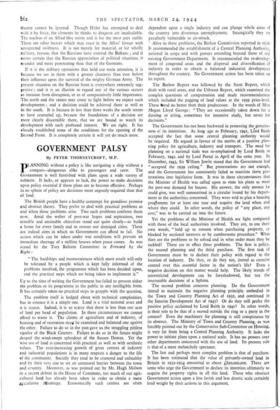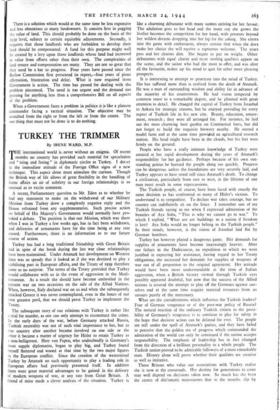GOVERNMENT PALSY
By PETER THORNEYCROFT, M.P.
PLANNING without a policy is like navigating a ship without a compass—dangerous alike to passengers and crew. The Government is well furnished with plans upon a wide variety of subjects. It lacks, or appears to lack, the power to make decisions upon policy essential if those plans are to become effective. Perhaps in no sphere of policy are decisions more urgently required than that of land.
The British people have a healthy contempt for grandiose promise and abstract theory. They prefer to deal with practical problems as and when those problems arise. Two such problems confront them now. Amid the welter of post-war hopes and aspirations, two sensible and attainable objectives stand out quite clearly—to build a home for every family and to restore our damaged cities. These are indeed aims in which no Government can afford to fail. No action which can be taken under war conditions will prevent an immediate shortage of a. million houses when peace comes. As was stated by the Tory Reform Committee in Forward by the Right :
" The hardships and inconveniences which must result will only be tolerated by a people which is kept fully informed of the problems involved, the programme which has been decided upon, and the practical steps which are being taken to implement it."
Up to the time of writing the Government has failed to present either the problem or its programme to the public in any intelligible form. It has certainly taken no practical steps to grapple with the question.
The problem itself is hedged about with technical complexities, but in essence it is a simple one. Land is a vital national asset and it is scarce. Indeed, it is so scarce that there is less than one acre of land per head of population. In these circumstances we cannot afford to waste it. The claims of agriculture and of industry, of housing and of recreation must be examined and balanced one against the other. Failure to do so in the past gave us the straggling pitiless squalor of the Black Country. Failure to do so in the future might despoil the wind-swept splendour of the Sussex Downs. Yet the wise use of land is concerned with practical as well as with aesthetic values. The ever-increasing growth of great centres of industry and industrial populations is in many respects a danger to the life of the community. Socially they tend to be cramped and unhealthy and by their very size to set an unnatural barrier between the town and ccuntry. Moreover, as was pointed out by Mr. Hugh Molson in a recent debate in the House of Commons, too much of our agri- cultural land has already been taken in order to obtain a mere bptculative ativantage. Economically such centres are often dependent upon a single industry and can plunge whole areas of the country into disastrous unemployment. Strategically they are peculiarly vulnerable to air-attack.
Alive to these problems, the Barlow Commission reported in 1939. It recommended the establishment of a Central Planning Authority, national in scope and with powers extending beyond those of any existing Government Department. It recommended the re-develop- ment of congested areas and the dispersal and diversification of industry in order to obtain a balanced industrial development " throughout the country. No Government action has been taken on its report.
The Barlow Report was followed by the Scott Report, which dealt with rural areas, and the Uthwatt Report, which examined the complex questions of compensation and made recommendations which included the pegging of land values at the 1939 price-level. These fared no better than their predecessor. In the words of Miss Megan Lloyd George: " They are occasionally taken down for a dusting or airing, sometimes for intensive study, but never for decisions."
The Government has not been backward in protesting the genuine- ness of its intentions. As long ago as February, 1941, Lard Reith accepted the fact that some central planning authority would be required. He argued in favour of the merits of a positive plan- ning policy for agriculture, industry and transport. The need for planning on a national scale was re-emphasised by Lord Reith in February, 1942, and by Lord Portal in April of the same year. In December, 1943, Sir William Jowitt stated that the Government had " accepted the 1939 ceiling." But protestations are not enough, and the Government has consistently failed to translate these pro- testations into legislative form. It was in these circumstances that the Minister of Health was called upon to state his plans to meet the post-war demand for houses. His answer, the only answer he could give, was well summarised in a circular issued by his depart- ment to the authorities concerned. They were told to plan a housing proetatrune for at least one year and acquire the land when and where they could. In other words, the policy of " any place, any cost," was to be carried on into the future.
Yet the problems of the Minister of Health are light compared with those of the local authorities involved. They are, to use their own words, " held up to ransom when purchasing property, or blocked by sectional interests or by cumbersome procedure." What then are the problems to be solved and in what order must they be tackled? There are in effect three problems. The first is policy, the second planning and the third purchase. The first task of Government must be to declare their policy with regard to the location of industry. Do they, or do they not, intend to exercise control over this essential factor in the nation's life? Even a negative decision on this matter would help. The likely trends of unrestricted development can be foreshadowed, but not the inscrutable decisions of a Sphinx.
The second problem concerns planning. Do the Government intend to maintain the negative planning principle embodied in the Town and Country Planning Act of 1932, and continued in the Interim Development Act of 1943? Or do they still prefer the positive policy acclaimed by Lord Reith in 1941? In other words, is their role to be that of a second outside the ring or a party in the contest? Even the machinery for planning is still conspicuous by its absence. The Ministry of Town and Country Planning, as was forcibly pointed out by the Conservative Sub-Committee on Housing, is very far from being a Central Planning Authority. It lacks the power to initiate plans upon a national scale. It has no powers over other departments concerned with the use of land. Its present role is that of a mere melancholy spectator.
The last and perhaps most complex problem is that of purchase. It has been estimated that the value of privately-owned land in Britain in 1932-1934 amounted to about ,C620,000,000. There are some who urge the Government to declare its intention ultimately to acquire the property rights in all this land. Those who obstruct Government action upon a less lavish and less drastic scale certainly lend weight by their actions to this argument.
There is a solution which would at the same time be less expensive and less obnoxious to many landowners. It consists first in pegging the value of land. This should probably be done on the basis of the 1939 level, subject to certain equitable adjustments. Secondly, it requires that those landlords who are forbidden to develop their land should be compensated. A fund for this purpose might well be created by a levy upon those landlords whose land had increased in value from efforts other than their own. The complexities of land tenure and compensation are many. They are not so great that they need be a bar to progress. Four years have passed since the Barlow Commission first presented its report,—four years of pious affirmation, frustration and delay. What is now required from Government is action. The time has passed for dealing with the problem piecemeal. The need is too urgent and the demand too pressing for anything less than a comprehensive Bill on all aspects of the problem.
When a Government faces a problem in politics it is like a platoon commander facing a tactical situation. The objective may be assaulted from the right or from the left or from the centre. The one thing that must not be done is to do nothing.



























 Previous page
Previous page